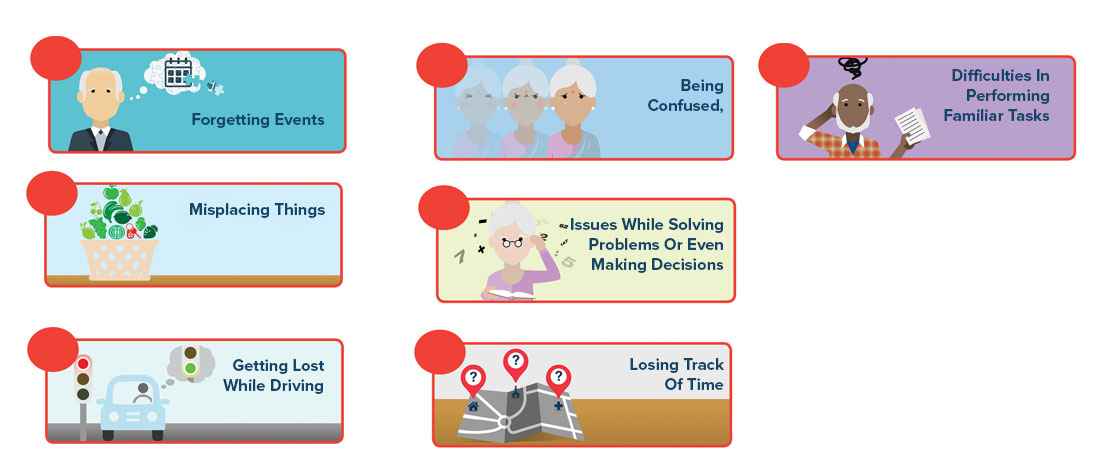
Dementia syndrome results from the disruption of specific large-scale neuronal networks, the location and severity of synaptic and neuronal loss, combine to produce the clinical features.
Dementia syndrome results from the disruption of specific large-scale neuronal networks, the location and severity of synaptic and neuronal loss, combine to produce the clinical features.
Key Facts:
- The estimated dementia prevalence for adult’s ages 60+ in India is 7.4%. About 8.8 million Indians older than 60 years live with dementia
- Women are seen to disproportionately be affected by dementia, both directly and even indirectly. The women are also seen to experience higher levels of disability-adjusted life years and the mortality due to dementia, but also provide 70% of care hours for people living with dementia.
Overview
Dementia is known to be a term for several diseases that can affect memory, the thinking, and ability to perform the daily activities.
The illness has the potential to get worse over time. It is seen to mainly affect the older people but not all people would get affected as they age ahead.
Risk Factors

- Old Age (More Common In Those 65 Or Older)
- High Blood Pressure (Hypertension)
- High Blood Sugar (Diabetes)
- Being Overweight Or Obese
- Smoking
- Excess Alcohol
- Physically Inactive
- Socially Isolated
- Depression
Dementia is a syndrome that could be caused by number of diseases which can over time destroy the nerve cells and damage brain that can typically lead to deterioration in the cognitive function.
Dementia also has physical, psychological, social and economic impacts, not only for the people that are living with dementia, but also for caregivers, their families and their society at large.
There is a lack of awareness and understanding of dementia, which results in the stigmatization and barriers to the diagnosis and care.
Signs and symptoms
The Changes in mood and behavior happen even before the memory issues arise.

The Early signs and symptoms are as follows:
- Forgetting Events
- Misplacing Things
- Getting Lost While Driving
- Being Confused,
- Losing Track Of Time
- Issues While Solving Problems Or Even Making Decisions
- Difficulties In Performing Familiar Tasks
- Misjudging Distances
Other changes in the mood are as follows:
- Anxiety, sadness and memory loss
- Changes in personality
- Any inappropriate behavior
- Withdrawal from either work or even social activities
|
Routine Evaluation |
Optional Focused Tests |
Occasionally Helpful Tests |
|
History Physical examination |
||
|
Adrenal Function |
||
|
Renal Function |
||
|
Urine Toxin Screen |
RBC Sedimentation Rate |
|
|
CT/MRI |
||
|
Brain Biopsy |
||
|
RPR or VDRL |
SPECT |
|
|
Lab Screen for Auto antibodies |
- Emotionless and withdrawal from other people's emotion
Diagnosis and Evaluation
Treatment and care
There is no known cure for dementia, but we can make a difference by supporting both the people that are living with illness and also those are caring for them.
People with dementia can also take certain steps to further maintain their quality of life and promote well-being by doing the following:
- Becoming physically active
- Stimulate the brain, by indulging in social activities
- Pursue new hobbies
- Stop smoking and drinking alcohol
In addition, there are some medications that can help manage the dementia symptoms:
- Cholinesterase inhibitors like donepezil
- NMDA receptor antagonists like memantine
- Medicines that can control blood pressure
- Selective serotonin reuptake inhibitors (SSRIs)
To seek Free Consultation from the Doctor:
- Contact: Dr. Ravin Sharma, (MBBS, MD in Radiology)
- Available: 24*7*365
- Phone Number: +919212125996
Why Ganesh Diagnostic and Imaging Centre should be your preference to screen you for Dementia?
At Ganesh Diagnostic and Imaging Centre, we are known for providing excellent service and care to its patients for decades. Lakhs of satisfied patients over the years!
It is an established and renowned diagnostic centre since 2001.
Their excellence is backed by NABH and NABL Accreditations.
NABH accreditation is proof of the highest standard of care and service provided to the patients. NABL accreditation reflects the competency of laboratories and equipment based on some national and international standards.
Test report is available digitally too.
Ganesh Diagnostic and Imaging Centre is a one-stop solution for getting all kinds of tests done, as all services are available under one roof.
The aim of GDIC is to provide the world’s finest technology at the lowest price.
The rates of scans are reasonably priced. Ganesh Diagnostic and Imaging Centre also offer FLAT 50% OFF on many tests.
References:
- https://www.who.int/news-room/fact-sheets/detail/dementia/?gclid=CjwKCAjwoqGnBhAcEiwAwK-OkcmEulVYBFE7WbUaNcFbeLP5cg4iYpidAndL9GPaNBYUJQ-BA6V-MhoCkUQQAvD_BwE
- Harrison’s Principles of Internal Medicine, 20 th edition, Volume 1









